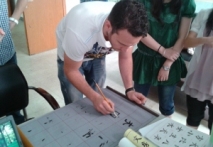Latest News
- Wuxi's Nanchang Street--a historic cultural district that combines classical charm, delicious food, and fun activities
- chinese study
- lastest courses
- Business Assistance/International Consortium of Stem Cell Research
- Foreigner's view of Jiangsu -Changzhou Jintan starts
- estimonials for Our new French Internship student Anais 企业表扬信
- The Double Seventh Festival in China Introduction
- Chinese Proficiency Test (HSK)
- China University Mining and Technology
- Wuxi Library
Students Say
Mandarin Student Zack
Mandarin Education School is a great place to learn Chinese and Chinese Culture.I've learned a lot in this school, my Chine...
Learn Chinese Travel China
If you want to learn Chinese and also discover China, Mandarin Education organize the most funny and cultural study tour.
The...
suzhou Mandarin Jude
I am Jude, I am learning Mandarin in Suzhou Mandarin School,I was learning in Wuxi Mandarin Education too.I like my Chinse Teacher...
chinese class
Improve your reading, speaking and your writing by experiencing our teaching methods,Offer free student Visa.
...
Wuxi Mandarin Jessie
I've learned Chinese for almost 8 years, I can understand what Chinese people say,but when I speak, I feel very uncomfor...
Chinese Internship or Jobs
You are looking for a professional experience abroad? Get the opportunity to discover the Chinese business,Look for an ...
Mandarinedu Student Florent
I love my Wuxi Mandarin Education School. It is the EASY MANDARIN Learning way, I am learning faster than I wanted.My teach...
Mandarin E Learning
Mandarin Education School offers you Online Chinese Courses. It has never been so easier to have Chinese courses ...
Mandarin Student Brad
I am studying Chinese in Mandarin Education School. I can speak quit good Chinese and talk to Chinese people by myself. Thank...
Wuxi Mandarin edu. Student Jennifer
I love learning Chinese in Mandarin Education School.That's a great place to learn and make friends.
...
Add Our School Official
to get more informations

0086 1866 1199 988
0086 510-81151808
Sandy.Swun
519988808
Mandarin Education School
Room 405, 4 Fl,Building No.8,
Maoye Business Center,
Chang jiang No.1,
New district , Wuxi City , China
How to Learn Mandarin Chinese Part 2
Many English speakers found that Mandarin Chinese is quite a complex language to learn. However, with commitment and daily practice it is certainly possible to successfully master. After 6 years of teaching Mandarin Chinese I have some suggestions on how best to learn this surprisingly easy language.
Part 2 of 3: Advancing Your Language Skills
1. Memorize simple vocabulary
No matter what language you're learning, the more words you have at your disposal, the sooner you will become fluent. Therefore, the next thing to do is to memorize some useful Chinese vocabulary.
•Some good vocabulary lists to start off with include: times of day (morning: zǎoshàng, afternoon: xiàwǔ, evening: wǎnshàng) body parts (head: tóu, feet: jiǎo, hands: shǒu) food (beef: niúròu, chicken: jī, egg: jīdàn, noodles: miàntiáo) along with colors, days, months, transport words, weather, etc.
•When you hear a word in English, think about how you would say it in Mandarin. If you don't know what it is, jot it down and look it up later. It's handy to keep a little notebook on you at all times for this purpose. Attach little Chinese labels (with the character, the pinyin and the pronunciation) to items around your house, such as the mirror, the coffee table and the sugar bowl. You'll see the words so often that you'll learn them without realizing it!
•Although having a wide vocabulary is good, remember that in Mandarin, accuracy is more important. It's no good learning a word if you can't pronounce it properly, using the correct tone, as different pronunciations could have entirely different meanings. For example, using the wrong tone (using mā instead of má) could be the difference between saying "I want cake" and "I want coke" - two completely different meanings.
2. Learn some basic conversational phrases
Once you have a basic grasp of vocabulary and pronunciation, you can move on to learning basic conversational phrases which are used in everyday Chinese speech.
•Hello = Nǐhǎo(你好。)
•What is your surname (family name)? = nín guì xìng?(您贵姓?)
•What's your name? = nǐ jiào shénme míngzi? (你叫什么名字?)
•Thank you = Xièxiè.(谢谢。)
•You're welcome = Bú yòng xiè.(不用谢。)
•Excuse me = Duì bu qǐ.(对不起。)
•I don't understand = Wǒ bù dǒng. (我不懂。)
•Goodbye = Zài jiàn.(再见。)
To be continued•••










